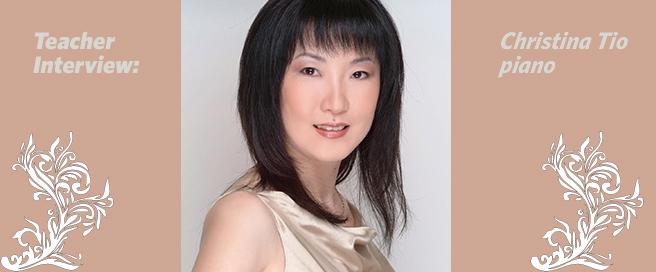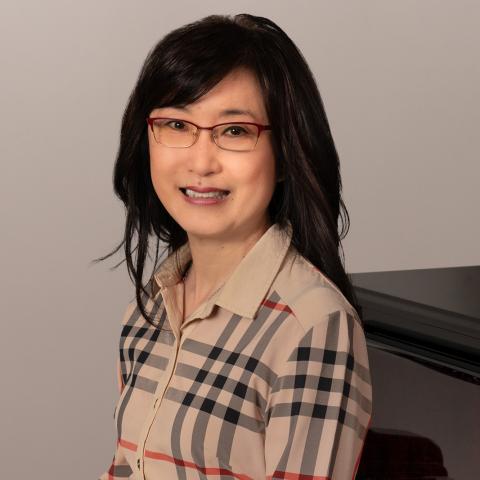Teacher Spotlight: Christina Tio, piano

September 10th, 2014
Interview by Erin Cano, violin
Dr. Christina Tio joined MIC as a Suzuki piano instructor in 2010. She teaches private lessons, group lessons, and chamber music.
What led you to become a Suzuki instructor?
I stumbled upon literature on Shinichi Suzuki when working on a case study on Japanese musicians for my doctoral research back in the UK, and was impressed by his teaching philosophy. I had the opportunity to finally seek out Suzuki training a decade later when my husband and I moved to Chicago. I became convinced that the Suzuki idea of developing the whole child based on the mother tongue approach was what I would like for my (then, future) child and my students. I wish I had grown up as a Suzuki kid myself! The Suzuki experience allows for the learning of music from a very young age in a most natural way. A cooperative relationship between teacher, parent and student builds character and nurtures qualities such as respect, discipline and endurance. What also appealed to me was the evidence of strong parent-child bonds in Suzuki families over the long haul. I wanted to be part of a movement that brings family together!
What is your favorite Suzuki piece to teach?
I’m not sure I have a favorite piece, though the Twinkle Variations have been a gratifying set of pieces to teach. These pieces allow very young students to acquire piano playing techniques and develop musicality very naturally. In over 30 years of teaching, I have been able to accomplish so much more with these pieces than with other method books and ideas for beginners.
Which of your teachers inspired you the most? What aspects of their teaching have you integrated into your own style?
One teacher who has impacted my life at multiple levels over the recent years is Rita Hauck. Rita’s holistic approach encompasses a comprehensive music education that also includes character building. She is relentless in modeling and communicating how excellence should be pursued in every aspect of life. I am also inspired by Rita’s example of teaching with integrity and grace. Music teaching has the potential to be a hugely egoistic profession – to produce students who perform to win prizes, to be everyone’s “favorite teacher”. Rita is all that without the ego because she has set out as a life mission not to glorify herself. Instead, she meets her students at heart level, she nurtures, equips and empowers. Rita teaches with integrity and grace – a posture I greatly admire, and seek to emulate.
Prior to coming to the United States, you taught piano, music history, and music theory at some of the top music colleges in Malaysia. What was your favorite music history or music theory topic to teach?
I enjoyed teaching musicological topics, which encourages the study of music history as more than accumulation of data and facts. Traditionally, the emphasis of the study of music history had been on the relationship between the music of the past and its original social and cultural context. My favorite task in my lectureship role at the music colleges over those years was to invite colleagues and students to consider that music embodied ideological meaning and that music is part of a person’s sense or cultural identity.
Your son Micah recently began Suzuki cello lessons at MIC. Now that you are a Suzuki parent and a teacher, have you developed any new insights?
My husband attends Micah’s cello lessons and follows up with practice at home. However, Micah also plays the piano and I have been both his piano teacher and practicing parent. Being a Suzuki parent has been both a fulfilling and humbling experience. Working through challenges together at the piano on a daily basis has taught me many things about my child I wouldn’t have otherwise known. I have also learned the need to be more sensitive, organized, patient and self-controlled. I hope this is also making me a better teacher and a more sympathetic support to parents in my sphere of influence.

